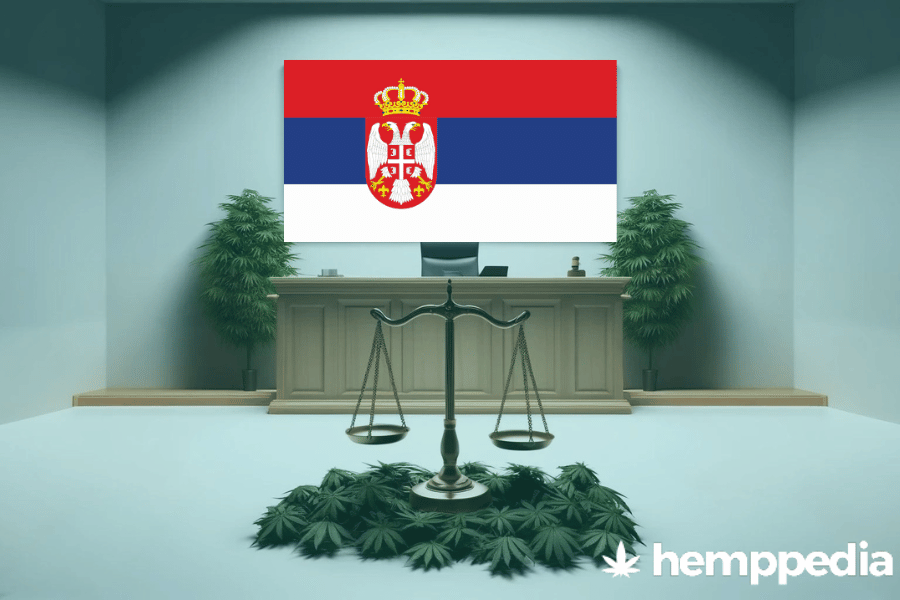TL;DR: Is CBD legal in Serbia?
In Serbia, the situation regarding Cannabidiol (CBD) is still ambiguous. While the sale of CBD products is not technically yet regulated, it’s not considered explicitly illegal because CBD derives from hemp, which is legal to cultivate in Serbia. However, laws are subject to change and interpretation, so the use of CBD products still carries a level of risk.
Summary of current CBD legal status
- Legal Status: Ambiguous
- Use and Possession: Unregulated
- THC Content: Must be 0.3% or less in hemp crops
- Cultivation of Hemp for CBD: Legal with restrictions
- Sale of CBD Products: Unregulated
Introduction to CBD
CBD is a naturally occurring compound extracted from the Cannabis sativa plant. While the plant family includes marijuana, CBD is primarily derived from the hemp variant, which has a much lower THC (tetrahydrocannabinol) content. THC is the psychoactive substance that causes a ‘high’, meaning CBD products can offer potential wellness benefits without the associated psychoactive effects.
Due to these beneficial properties, many countries are moving towards the legalisation and regulation of CBD. However, in Serbia, the laws and regulations surrounding the use and sale of CBD-based products remain ambiguous.
Overview of CBD Legislation in Serbia
Key Terms
CBD is short for Cannabidiol, a compound found in the cannabis plant that is associated with several potential health benefits. Hemp and Marijuana are two types of Cannabis sativa. Hemp contains less THC and is used for CBD production. Full-spectrum CBD products contain all cannabinoids, including THC, while Isolate CBD contains only CBD.
Legal Landscape
Global laws on CBD vary, with most European nations legalising CBD under strict regulations. However, in Serbia, the legal stance is ambiguous due to a lack of specific CBD laws or controlled substance restrictions.
The cultivation of hemp in Serbia is legal, given that the THC content is below 0.3%. This indirectly makes the production and use of CBD legal since it is derived primarily from the hemp plant.
Regulatory Bodies
The Ministry of Agriculture and Ministry of Health are the main bodies that control and regulate the cultivation of hemp and the sale of CBD products respectively in Serbia.
Conditions and Restrictions
While there aren’t specific regulations for CBD, Serbia’s laws dictate that any products derived from the cannabis plant must contain less than 0.3% THC, the psychoactive compound in marijuana.
Historical Context
The cultivation of hemp, where most CBD is derived, has long been part of Serbia’s agricultural industry. However, the use of CBD and its products has gained popularity within the country only in recent years, and legal regulations are yet to be put in place.
Possession, Use, and Sales
As the cultivation of hemp is legal (with THC restrictions), the possession and use of CBD products fall into a grey area. The sale of CBD products is not explicitly prohibited, suggesting that purchase, possession, and personal use may be legal – but this is subject to change.
Enforcement and Penalties
As of now, there have been no reported cases of penalties or enforcement against CBD users in Serbia. However, with ambiguous laws, there is always a degree of risk involved.
Comparative Analysis
In contrast to many European countries where CBD is legal and regulated, Serbia’s lack of CBD specific laws puts it in a grey area. However, with the global trend of CBD law relaxation, Serbia might soon follow suite.
Conclusion
The legal status of CBD in Serbia falls in a grey area, not explicitly prohibited, but not regulated either. The use of CBD products in Serbia carries a certain level of risk due to the ambiguity of the law. It is hopeful that specific legislation outlining the use and sale of CBD-based products will be established soon, considering global trends towards the legalization of CBD.





